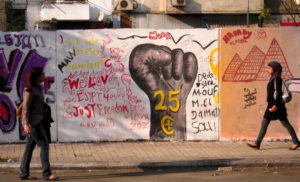Translating the Egyptian Revolution
 Activist use of translation to connect with global publics and protest movements
Activist use of translation to connect with global publics and protest movements
Professor Mona Baker, University of Manchester
This study examines one aspect of the 2011 Egyptian Revolution which has received no attention in public or academic circles so far, namely, the language-based practices that allow Egyptian protestors to contest dominant narratives of the Revolution and, importantly, to connect with, influence and learn from regional and global movements of protest, including the Tunisian uprising and the ‘Occupy’ movement. More specifically, the study focuses on the use of translation by various groups of well-educated and committed Egyptians who have the language resources to provide an alternative interface with global audiences, one that projects a different account of the Revolution than can be found in mainstream sources and simultaneously questions hegemonic, patriarchal narratives circulating within Egyptian society, for example by video-recording the testimonies of women who have been active in the Revolution and disseminating them on the web to question male-centred accounts of the uprising.
A cornerstone of the political activities of such groups is the circulation of written documents and audiovisual material that are originally produced in Arabic, to contest mainstream domestic narratives. These documents (press releases from activist groups, news not reported in mainstream sources, short documentary films) are then translated, primarily into English, in order to reach a wider global public and intervene in shaping narratives of the Revolution that circulate internationally. The study aims to offer a nuanced, empirical account of how these groups function, how they mobilise volunteer translators, how they see their relationship with global movements of justice, and what their modes of practice, including the selection of texts and audiovisual material to translate, might reveal about the extent to which they are embedded in the culture of global movements of collective action. In doing so, it sets out to demonstrate that translation is a key and pervasive mode of interaction that exercises significant influence on the way we come to understand the events unfolding around us at any moment in time. As a major tool of contestation, it is also increasingly used to connect activists across the world, and to demonstrate that local and global grievances cannot be addressed separately but must be negotiated and contested jointly across national and linguistic boundaries.
Professor Mona baker
University of Manchester project page
RCUK Gateway to Research
Outputs and Events:
A recording of a workshop on activist subtitling, organised by Mosireen (one of the collectives under study) in April 2014.
Video of the First Annual Martha Cheung Memorial Lecture, titled The Prefigurative Politics of Volunteer Subtitling in the Egyptian Revolution, May 2014 – reporting initial findings
Interview with Free Word about the project
An international conference held in Cairo 6-8 March 2015: The Only Thing Worth Globalizing Is Disssent – Translation and the Many Languages of Resistance, to conclude the project
Video of a seminar given at the American University in Cairo on 9 March 2015, titled ‘Subtitling in the Context of Contemporary Political Activism’
An edited collection featuring contributions by Egyptian and non-Egyptian activists and scholars: Translating Dissent: Voices from and with the Egyptian revolution, published by Routledge (details also available here)
A chapter in Translating Dissent, edited by Mona Baker, titled ‘Beyond the Spectacle: Translation and Solidarity in Contemporary Protest Movements’. Available as free access here
http://translatingcultures.org.uk/awards/fellowship-awards/translating-the-egyptian-revolution-activist-use-of-translation-to-connect-with-global-publics-and-protest-movements/